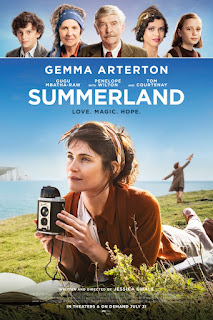The 52: Summerland
From June 2023 to June 2024 I'll be watching a lgbtqia+ film each week and coming back here with my thoughts, feelings and plenty of hopes we aren't met with the "kill your gays" trope. I call this The 52.
Today I'm reviewing Summerland, a film that's been on my radar for some years now and the very first for The 52! It's been about a week since I sat down to watch this one and I... still can't quite decide if it was a good start to the project or not. It was surprising? Heck, that plot twist was really surprising, but surprise isn't synonymous with good and I feel ambivelent about a lot that happened in the film. Let's break it down.
The title Summerland refers to a certain belief of the afterlife that Alice, the main character, is researching, tying it together with myth, legend and stories of castles in the sky (there was a minute or two where things got very Ghibli and I was thrilled at the idea of adventuring through floating castles, but alas)- castles that, for more reasons besides the fact they don't usually float, shouldn't be there. There's a theory that seeing the castles means someone's trying to reach out to you from Summerland, trying to make contact, and with the death of Alice's father in the first World War I think we conclude she's chasing this story (and writing her own about it) as a way of maintaining contact with him.
But I'll be honest: a lot of symbolism goes right over my head. I much prefer having things spelled out for me and as I sat here just now trying to work out why she had chosen that as her new book I couldn't fathom why; her father's death isn't a huge point to the plot, almost more a "well if we say this happened then it ties other things in neatly so we'll do that. Nice. Nice? Nice." But again *points to self* not very clued in to symbolism.
Alice is a very sterotypical portrait of a lesbian. She lives alone by the sea, on the far outskirts of a community whose children taunt her, calling her a nazi and a witch, creating their own lore around her oddness. Her hair is forever messy and she dresses differently to the other women we see. She is angry and focused and doesn't like being interrupted. She doesn't like her space being invaded, which it continually is.
She makes a joke about not having a cat.
She was an amusing character, not altogether likable and not altogether caring whether she was. The main bones of the story follow the evacuee child she is forced to care for, her gradual softening around him and his eagerness to be a part of her life- and for the longest time I was perplexed as to how the story would become more than just suggestibly queer.
The moment it did, I blanched: the first on the list and it's a kill your gays?!
For the first time we meet Alice's lover it is through memory, memory that fills our lead with tears.
I can say it is not a kill your gays, a rating in and of itself that I think I'll be using on every film for this project. And yet neither is it... ostensibly a happy film? There is joy and beauty and peace, alongside loss and pain and grief. It is painted beautifully and artfully and I did enjoy it, I snorted and smiled and sat breathing in the scenes of this film, but I had hoped for summertime warmth, for the joy of more than a strange, confusing, puzzling story. And unfortunately I was presented with the latter.
It goes without saying that lgbtqia+ films deserve to, at the very least, include lgbtqia+ in their storytelling. We know our stories and should have at least equal footing and opportunity in whether we get the chance to tell them. I'm going to cover a huge range of films in this project and I hope many of them will feature stories written, directed and acted by members of the lgbtqia+ community.
Like things shorter? Follow me on Letterboxd and see my Summerland review.

Comments
Post a Comment